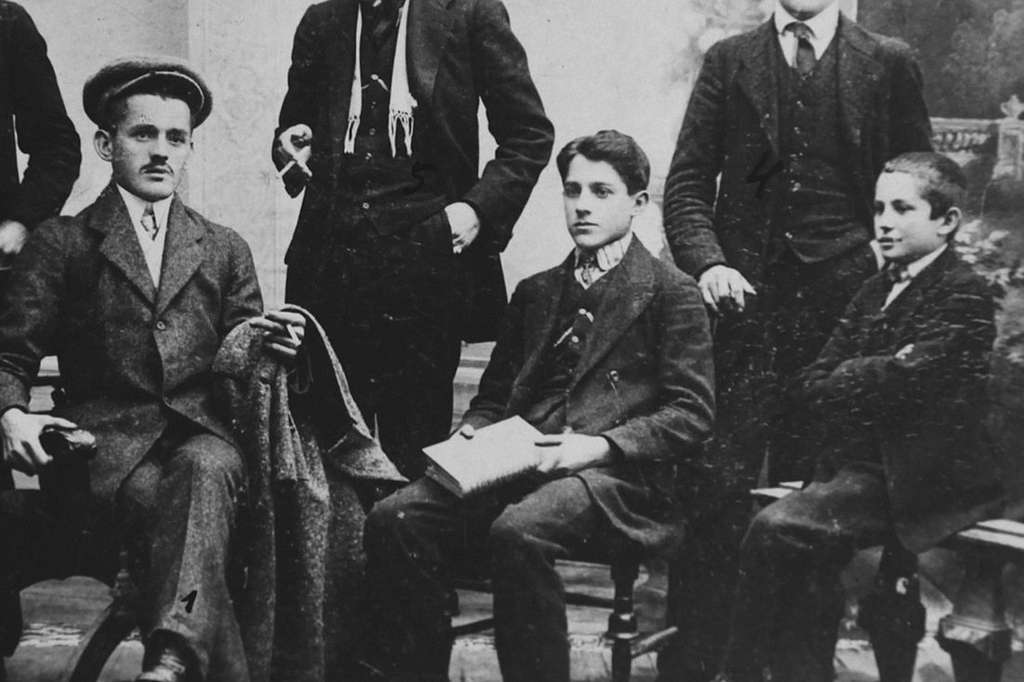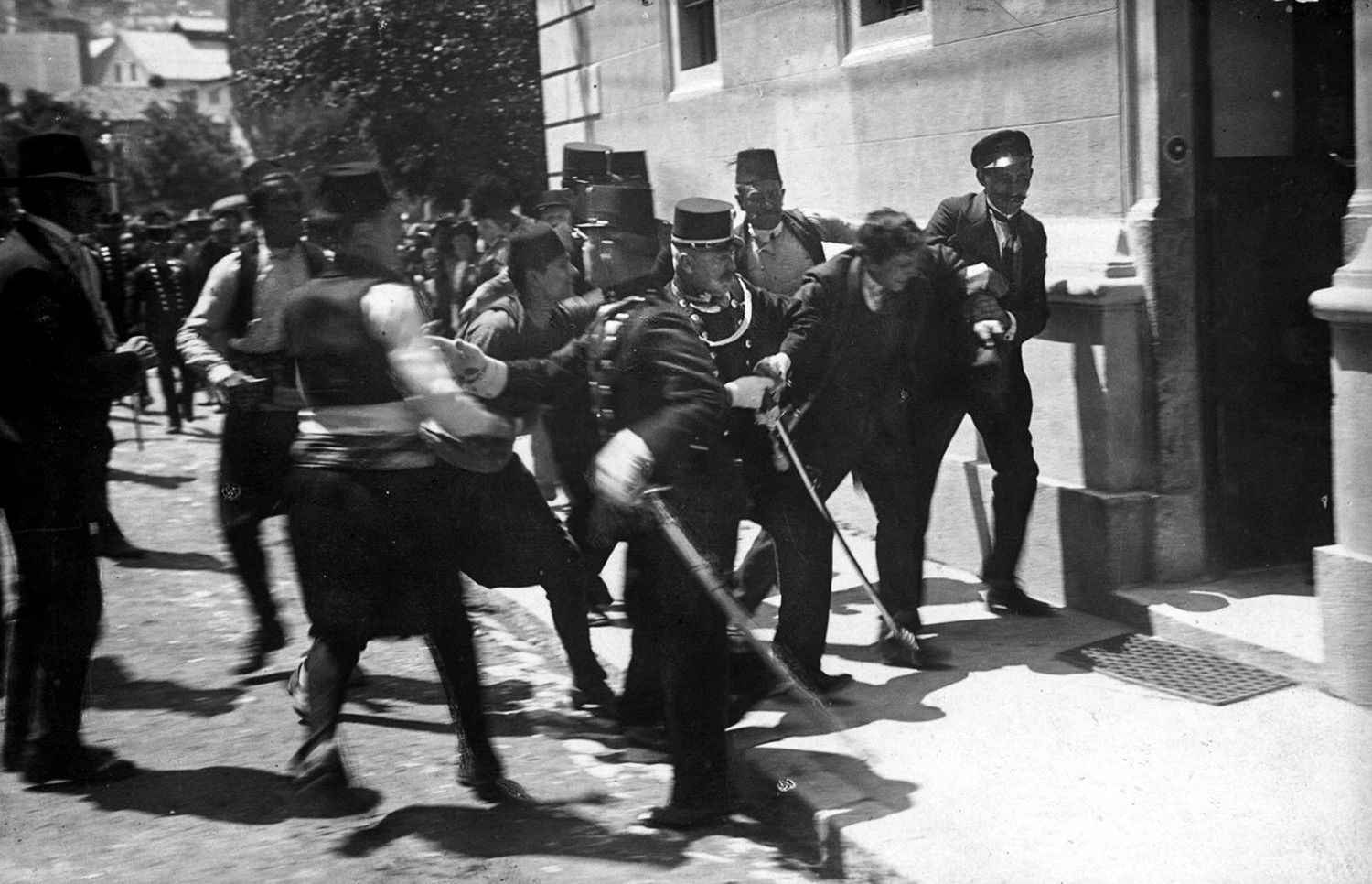On Gavrilo Princip - A World War Starter
There's no denying the magnitude of Gavrilo Princip's impact on global history. This young Bosnian Serb nationalist stands as the man who sparked World War I. His claim to his infamy? The assassination of Archduke Franz Ferdinand of Austria, a deed that single-handedly tipped the world into a state of war.
Yet, for all the weight of this act, much about Princip's life is cloacked in shadows and misconceptions. It's important that we ask: Who was the man known as Gavrilo Princip beyond the notorious event? What internal turmoil or conviction led him to such a pivotal act of violence? And after his consequential act and subsequent arrest, his life remains a compelling mystery. What unfolded for this man, whose actions ignited the flames of a war that forever altered the course of human history?
Early Life
In the heart of a rugged terrain in western Bosnia, nestled among the mountains, lies the remote village of Obljaj. It was here, on July 25, 1894, where Gavrilo Princip, the second child among nine of Petar and Marija Princip, first opened his eyes to the world.
The Princips, like most families around them, embraced a simple existence, their lives deeply rooted in the soil they tilled. They were peasant farmers, wrestling a living from the harsh rural lands that both sustained and challenged them.
Despite the adversity, two potent forces guided their lives - a resolute sense of national identity and an unwavering Orthodox Christian faith. These were the sparks that would kindle a guiding fire in young Gavrilo's heart, shaping his worldview and influencing the course of his life.
Gavrilo's early life in the rural landscapes of Bosnia was heavily influenced by tales of Serbian bravery and resistance against Ottoman rule, igniting his youthful nationalistic sentiment. His father, an experienced veteran of the Serbian-Turkish wars, further fanned these flames, instilling a longing for a united South Slav state in his son.
When Gavrilo was just nine, he was sent to Sarajevo to attend the Merchant School, marking a shift from his rural life to a more urban setting brimming with intellectual influences. It was here that the tendrils of interest in politics began to entwine his mind, with the nationalistic ideologies brewing in the Balkans particularly catching his attention.
However, his radical leanings were truly sparked by the works of revolutionaries like Nikolay Chernyshevsky and Peter Kropotkin. These writings, in the backdrop of a tumultuous political climate, stoked his growing discontent with the Austro-Hungarian rule and a desire for his homeland's liberation from foreign control.
This radicalism, cultivated over the years, eventually led to a significant turn of events in 1911 Princip was expelled from the Merchant School for participating in anti-Austro-Hungarian demonstration, marking a bold step in his journey toward the historical act that would define his legacy.
Stepping into Young Bosnia

In the aftermath of his expulsion in 1912, Princip aligned himself with Young Bosnia, a radical movement uniting Serb, Croat, and Bosniak students under a common cause.
The collective was bound together by the shared aspiration for liberation from Austro-Hungarian rule and a vision of a united South Slav state. Characteristic of Young Bosnia was its members' commitment to direct action, including assassination, as a means to reach their political objectives.
Princip's joining of Young Bosnia marked a decisive escalation in his political involvement, pushing him further down the path of violent resistance as a tool for enacting political change.
The journey to radicalism
In the backdrop of his deepening involvement with Young Bosnia, Princip's political ideologies were evolving under a mix of influences, ranging from the nationalist sentiment growing in his homeland to radical European ideas.
The surge of Slavic nationalism, advocating for the freedom of South Slav peoples from Austro-Hungarian rule and their unification, deeply resonated with him, shaping his actions in the years to come.
However, Princip's ideological orientation wasn't singularly nationalistic. He was also strongly influenced by European anarchists and revolutionaries' works, with the writings of Russian author Nikolay Chernyshevsky and anarchist Peter Kropotkin leaving significant impressions.
Their emphasis on direct action and critique of oppressive state systems echoed Princip's growing dissatisfaction with Austro-Hungarian authority over Bosnia, further fueling his radical leanings.
The course to the deadliest conflict
The seeds of one of history's deadliest conflicts were planted on June 28, 1914. Yet, the event that set the stage was not spontaneous—it was a meticulously planned political statement.
The men behind the plot, Gavrilo Princip, Nedeljko Čabrinović, and Trifko Grabež, were propelled by nationalist ideologies simmering in the Balkans for decades. Archduke Franz Ferdinand, heir to the Austro-Hungarian throne, became their target, seen as the embodiment of the Austro-Hungarian rule over the South Slav peoples.
Members of Young Bosnia, supported by the secret Serbian military society, Black Hand, laid out the assassination plan. The trio was chosen for the execution, equipped with weapons, training, and a mission to assassinate the Archduke during his visit to Sarajevo.
The day that changed the world
The day of the assassination saw the conspirators in position along the Archduke's motorcade route. The first attempt on the Archduke's life—Čabrinović's bomb—failed to hit the mark, yet the Archduke carried on with his itinerary.
Fate, however, had placed Princip in proximity to the Archduke's car as it misrouted near a café where Princip was standing. In the blink of an eye, he fired two shots, mortally wounding the Archduke and Duchess Sophie.
Princip's arrest and the aftermath

Princip was apprehended instantly and placed into custody. The assassination sent a ripple of shock across Europe, the repercussions of which were far more significant than any of the conspirators could have envisaged.
Backed by Germany, the Austro-Hungarian Empire delivered an ultimatum to Serbia, the conditions of which Serbia could not entirely fulfil. Consequently, Austro-Hungary declared war on Serbia, setting in motion the catastrophic sequence of events that would become known as World War I. The assassination, originally intended as a statement of resistance, inadvertently triggered one of the most destructive wars in human history.
In the immediate aftermath of the assassination of Archduke Franz Ferdinand, Gavrilo Princip found himself behind bars. Swiftly apprehended, he would soon face justice for his pivotal role in the event that triggered the start of World War I.
The court proceedings kicked off in Sarajevo on October 12, 1914. Princip stood accused alongside his co-conspirators, the charges against them as severe as they were grave: treason and murder. Princip, however, maintained a defiant stance throughout the trial. He didn't deny his actions; in fact, he openly admitted to them, expressing zero regret. He claimed that his motive was to liberate his people from the yoke of Austro-Hungarian control.
A curious aspect of the trial was Princip's age. At the time of the assassination, he was a mere 27 days short of his 20th birthday, the legal threshold for adulthood in Austria-Hungary. This had significant implications for his sentencing. Under the prevailing laws, he could not receive the death penalty. Consequently, on October 28, 1914, Princip was handed down the maximum possible sentence for a minor - twenty years of incarceration.
Gavrilo Princip's incarceration in Theresienstadt prison, a fortress in modern-day Czech Republic, marked a new phase of hardship and suffering. Solitary confinement was his lot, a punitive measure reserved for the most hardened of criminals. In the chill and damp of his cell, his health began to falter.
By 1916, tuberculosis had taken hold of him. The disease, aggravated by malnourishment, rapidly sapped his strength. A year later, it necessitated the amputation of his right arm. Yet, even in such straits, Princip remained unyielding. Reportedly, he found solace in the belief that he had fulfilled his mission of igniting a revolution.
As the months passed, his health fell into a steady decline. The inhospitable conditions of his confinement, paired with the ravages of his illness, took their toll. Nonetheless, he remained steadfast in his convictions to the end, holding fast to the cause that he had sacrificed so much for.
Finally, on April 28, 1918, less than halfway through his sentence, Princip succumbed to his illness. He met his end in the solitary confines of his cell, far removed from the spectacle of his trial and the epoch-defining event he had set in motion. In a final indignity, he was interred in an unmarked grave within the prison's cemetery — a quiet end for the man who had dramatically reshaped history.
Despite his passing, the shadow of Gavrilo Princip loomed large over the European landscape. His actions triggered a series of events that led to substantial political upheaval, particularly in the Balkans, where his dream of a unified South Slav state was realized with the formation of the Kingdom of Yugoslavia after World War I.
Yet, the new state was far from stable, plagued by ethnic tensions and political instability — a theme that would persist throughout the 20th century. Furthermore, his actions indirectly led to the collapse of the Austro-Hungarian Empire he had sought to resist, prompting the birth of multiple new nations.
On a broader scale, the fallout of World War I paved the way for the rise of totalitarian regimes in countries such as Russia, Italy, and Germany, planting the seeds for the Second World War.
Princip's legacy remains a topic of contention. In the newly formed Yugoslavia, he was lauded as a national hero, a martyr for the South Slav cause. His remains were relocated to Sarajevo and placed in a chapel dedicated to national heroes, further cementing his revered status.
However, this image of Princip as a hero was not universally accepted. In Austria and Hungary, he was seen as a symbol of violent nationalism, a terrorist who had precipitated the demise of the Austro-Hungarian Empire. This perception of him as a destructive force was also prevalent globally, with many seeing him as a murderer who initiated a catastrophic worldwide conflict.
Even a century later, views on Princip remain polarized. On the 100th anniversary of the assassination in 2014, while a statue in his honor was unveiled in Serbia's capital, Belgrade, solemn commemorations were held in Sarajevo and Vienna — a stark reflection of the enduring controversy surrounding Princip's legacy.
